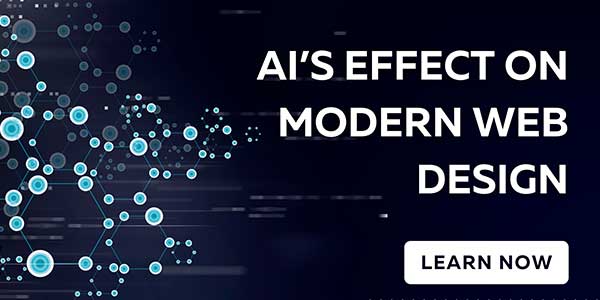
In the realm of web design, the introduction of Artificial Intelligence (AI) marks a significant shift from traditional methodologies to a more dynamic, user-focused approach. AI’s integration into web design tools and processes has revolutionized how designers conceive and implement websites, making them more responsive to user needs and behaviors. This transition from conventional practices to AI-influenced design is not just about technological advancement; it’s a paradigm shift that blends creativity with data-driven insights, paving the way for websites that are not only aesthetically pleasing but also highly intuitive and personalized for each user.
Table of Contents
The Basics Of AI In Web Design
In the realm of modern web design, Artificial Intelligence (AI) and Machine Learning (ML) are increasingly pivotal. AI refers to the simulation of human intelligence in machines, designed to think and learn like humans. This integration into web design focuses on enhancing the user experience, automating design processes, and optimizing site functionality.
For example, AI can analyze user data to create more intuitive layouts, personalize content, and improve site navigation. Machine Learning, a subset of AI, allows a website to adapt over time based on user interactions. This leads to design elements becoming more responsive and dynamic. Such applications of AI and ML in web design not only streamline the design process but also ensure websites are more user-friendly, adaptive, and efficient.
AI Driven User Experience Design
In the realm of AI-driven user experience design, the role of artificial intelligence is pivotal in tailoring websites to meet individual user needs and preferences. By harnessing AI, web designers can analyze vast amounts of user data, understanding behavior patterns to optimize site layouts and navigation for an enhanced, personalized user experience.
This intelligent personalization not only elevates user engagement but also streamlines the journey across the website, ensuring that each interaction is intuitive and relevant to the user’s specific interests and behaviors. Consequently, AI becomes an indispensable tool in crafting user-centric, dynamic web designs that adapt to the evolving expectations of the digital audience. Through AI’s capacity to decipher user behavior and preferences, web designers can create websites that feel like tailored experiences, ultimately enhancing user satisfaction and loyalty.
AI In Responsive And Adaptive Design
AI plays a pivotal role in modern web design by significantly contributing to responsive and adaptive design practices. In responsive web design, AI algorithms analyze user device data, such as screen size and orientation, and dynamically adjust website layouts and content to ensure optimal viewing across various devices.
Moreover, AI-powered predictive modeling anticipates user interactions, enabling the creation of adaptive design elements that respond to user behavior in real-time. This not only enhances user experience but also allows websites to seamlessly adapt to changing user needs and preferences, making AI an invaluable tool for crafting web experiences that are both user-centric and technically efficient.
Automated And Efficient Design Process
In the realm of web design, AI is revolutionizing the creative process by automating and streamlining design workflows, leading to faster and more efficient design creation. AI tools and algorithms, such as automated layout generators and predictive design recommendations, empower designers to expedite tasks that once required substantial time and effort.
AI can suggest design elements that resonate with the target audience, by analyzing user data, optimizing not only the speed but also the effectiveness of the design process. This efficiency not only saves valuable time for web designers but also opens up new possibilities for innovation and experimentation in web design, ultimately resulting in more responsive and user-centric websites.
AI And Accessibility In Web Design
AI plays a pivotal role in advancing web accessibility, making online experiences more inclusive for all users. Through machine learning algorithms, AI can automatically generate alt text for images, ensuring that visually impaired individuals can access the content effectively. AI-driven speech recognition technology enables voice commands, facilitating navigation for those with motor disabilities.
Moreover, AI-powered chatbots provide real-time assistance, aiding users with disabilities in finding information and engaging with websites effortlessly. In essence, AI not only enhances web accessibility but also fosters a more inclusive digital environment, promoting equal access and usability for diverse audiences.
AI Powered Chatbots And Interaction
AI-powered chatbots have revolutionized user engagement on websites by providing real-time assistance and personalized interactions. These intelligent bots use natural language processing to understand user queries and respond with relevant information, making the user experience more seamless and efficient.
Moreover, they play a crucial role in enhancing customer service by addressing common inquiries, resolving issues, and even facilitating transactions. AI chatbots work tirelessly, 24/7, ensuring that visitors receive immediate attention and support, thereby improving overall satisfaction and retention rates. Their impact on website interaction is undeniable, as they bridge the gap between businesses and customers, making online interactions more convenient and productive.
The Future Of AI In Web Design
The future of AI in web design holds exciting prospects as it continues to shape the digital landscape. Emerging trends suggest that AI will play a pivotal role in further personalizing user experiences, offering real-time website customization based on individual preferences. Additionally, AI-driven design tools are expected to become more intuitive and accessible, empowering designers to collaborate seamlessly with AI algorithms.
The integration of AI into web design will likely lead to more efficient design processes, with AI automating routine tasks and enabling designers to focus on creativity. Furthermore, AI’s ability to analyze user data will lead to data-driven design decisions, ensuring websites are optimized for user engagement. In essence, AI is set to revolutionize web design by making it more dynamic, personalized, and efficient, shaping a future where websites adapt and evolve in real-time to meet user needs and preferences.
Challenges And Ethical Consideration
In the realm of AI-driven web design, it’s imperative to acknowledge and navigate a set of unique challenges and ethical considerations. Challenges include the need for human oversight to ensure AI-generated designs align with user preferences and brand identity. Additionally, the risk of perpetuating biases present in AI algorithms requires careful monitoring and mitigation.
Ethical considerations encompass issues related to data privacy, transparency in AI decision-making, and the responsible use of AI-generated content. Striking the right balance between harnessing AI’s potential for innovation and upholding ethical standards is crucial to ensure that AI in web design benefits both designers and users while maintaining integrity and fairness in the digital landscape.
Conclusion
In summary, the impact of AI on web design is undeniably transformative, revolutionizing how web design agencies across the globe approach their craft. The essence of exceptional web design still relies on the delicate equilibrium between AI innovation, which streamlines processes and optimizes functionality, and the irreplaceable touch of human creativity, which adds the soul and aesthetic finesse that make websites truly unique. Striking this balance is the key to crafting web experiences that seamlessly blend the best of both worlds, offering users a harmonious fusion of technology and artistry.

 About the Author:
About the Author:
















Be the first to write a comment.